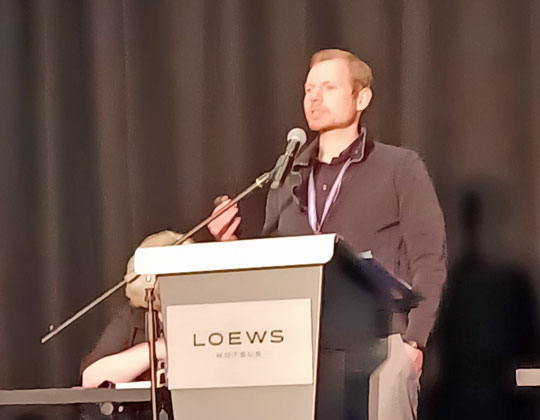Listen to truckers about highway safety, OOIDA Foundation says

KANSAS CITY, Mo. – A large portion of the Midwest Commercial Vehicle Safety Summit focused on the latest technological advancements, including the potential deployment of autonomous vehicles.
However, one of the sessions on Thursday, June 2, put technology’s limitations into perspective. A session titled “Owner-Operators and Safety Opportunities” was delayed for several minutes as organizers attempted to connect one of the panelists remotely. Initial attempts to fix the issue seemed to only make the matter worse, and the remote connection led to audio feedback problems in the conference room.
Then Andrew King, a panelist and research analyst for the OOIDA Foundation, said what many others in the room were likely thinking.
“You have to love technology … And they want autonomous trucks?”
Although unplanned, the joke served as a great way to start a session aimed at looking at safety from the perspective of truck drivers and owner-operators.
Highway safety view from 8 feet
King and OOIDA Foundation Director of Operations Tom Weakley spoke about alternative ways to improve highway safety, including by paying drivers fair wages and eliminating detention time, improving training, and providing truck drivers a safe place to park.
OOIDA represents more than 150,000 truck drivers. Many of its members work as owner-operators and possess decades’ worth of experience behind the wheel.
“Our members are extremely concerned with safety on the roads,” Weakley said. “This is our livelihood.”
Weakley said that researchers and regulators tend to look at safety from a 30,000-foot view, while truck drivers see the realities on the highway from 8 feet away.
“What owner-operators and drivers see out there may differ quite a bit from what a lot of others are looking at,” he said.
Surveys conducted by the OOIDA Foundation indicate that truck drivers have major concerns about unproven technologies and that they believe there should be more enforcement on the road to remove the reckless drivers. OOIDA members also call for increased driver training requirements and flexibility in the hours of service.
“If you want to know what a driver thinks, come talk to us,” Weakley said. “You may be surprised.”
Midwest Commercial Vehicle Safety Summit
The two-day safety summit concluded on Thursday. The inaugural event brought together federal agencies, industry, enforcement, engineers, university researchers, insurance companies and other interested parties with the goal of increasing commercial motor vehicle safety in the Midwest.
On Wednesday, an FMCSA official spoke about driving habits during the pandemic.
“Overall traffic went down in the beginning, but the aggressiveness of drivers in general, especially among passenger vehicle drivers, went up dramatically,” said Darrell Ruban, associate administrator for FMCSA’s Office of Safety. “I’ve heard that from every state. With that behavior, the culture shifted a little bit, because people had more open road.
“Then over time, traffic starts coming back. But guess what? The culture and behavior did not change. That’s what I’ve heard around the country. That’s what I’ve seen on accident reports. So when I use the term ‘culture,’ we’ve got a daunting task ahead of us in changing the culture, especially among passenger vehicles.” LL









